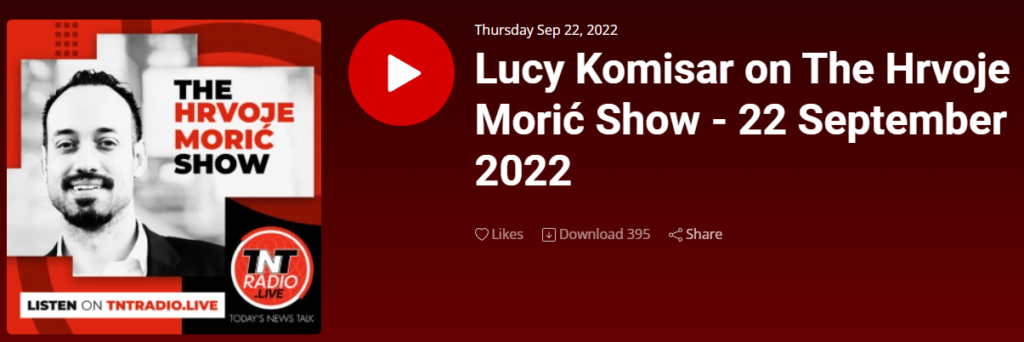
Lucy Komisar talks to Hrvoje Morić about the Browder hoax, including Browder’s start as a crook skimming profits from Russian titanium company, Avisma, illicit buys of Gazprom shares for himself and the Ziff Brothers, the role of the Trump Tower meeting, proof Magnitsky wasn’t murdered, how Magnitsky Act was passed in a deal for the Jackson-Vanik trade amendment repeal and why Congress and the media lie about it all.
Here is the full text:
Q: For you, what kicked off this story as something worthy of investigating?
A: I was reporting on democratic oppositions in countries that included the Philippines, Zaire and Haiti. In each one, opposition people told me the dictator had looted the country and stashed the money offshore in places such as Switzerland. In 2000 I got a U.S. National Research Council grant to study money laundering in Russia. I found it!
But the crook I discovered was William Browder, who was involved in illegally siphoning profits from Avisma, a Russian titanium company, through transfer pricing on the Isle of Man. That means an Isle of Man shell company bought Avisma titanium at a fake low price and sold it on the market at the real price, with Browder and collaborators skimming the difference.
Browder and his collaborators had bought Avisma from Mikhail Khodorkovsky, another crook, who passed along the transfer pricing operation as part of the deal. Browder spoke at a Moscow event to which press were invited, and I asked him about Avisma. He replied with an attack on me, but at the coffee break other reporters who knew the truth laughed. From then, I began to investigate Browder.
Q: The Obama administration demonstrated they stood behind Browder throughout this. Is this connected in any way to the Russian Uranium One purchases involving Hillary Clinton?
A: I don’t know. I never investigated that. Obama did not start out standing behind Browder. The Jackson-Vanick amendment put in place in the mid-1970s imposed trade sanctions on the Soviet Union to punish it for not allowing Soviet Jews to emigrate. Well, nobody could emigrate. Eventually 1.5 million Jews were allowed to leave the country. Thirty-seven years later the Soviet Union no longer existed, and everybody could emigrate, but Jackson-Vanik was still on the books. It blocked American corporations from enjoying the same trade benefits with Russia as one of the world‘s WTO members. So, the U.S. business community said Jackson-Vanik had to go, and the Obama administration agreed. So did John Kerry, chairman of the Senate Foreign Relations Committee. They needed an act of Congress.
Meanwhile, Kerry opposed the Magnitsky Act, which he considered interference in Russia, you might call it meddling, and had been delaying bringing it to vote in committee. Browder got Senator Joe Lieberman, conservative Democrat from Connecticut, to agree to block Jackson-Vanik repeal unless the administration stopped blocking his Magnitsky Act. Lieberman and the other cosponsors of the Magnitsky Act sent a letter to Montana Democratic Senator Max Baucus, chairman of the Senate Finance Committee. The letter said, “In the absence of the passage of the Magnitsky legislation, we will strongly oppose the lifting of Jackson-Vanik.” So, Kerry stopped his opposition to the Magnitsky Act. The two bills were combined. First the bill would be brought up at the Senate Foreign Relations Committee to pass Magnitsky, then it would go before the Finance Committee to repeal Jackson-Vanik, and then, it would go before the full Senate for a vote.
Kerry called for a meeting of the Senate Foreign Relations Committee in June 2012, with the purpose of approving the Magnitsky Act. At the hearing, Kerry said that America was not a perfect country, and that the people in that room should be “very mindful of the need for the United States not to always be pointing fingers and lecturing and to be somewhat introspective as we think about these things.” He was “worried about the unintended consequences of requiring that kind of detailed reporting that implicates a broader range of intelligence.” He didn‘t have to worry. Reporting? Intelligence? Actual evidence would never be required! The U.S. was setting up a kangaroo court and calling it a human rights tribunal! The bill passed the House 365 to 43 on November 2012.
Voting “No” were 37 Democrats and 6 Republicans. Among them Maxine Waters and Ron Paul. And surprisingly New York Democrat Jerrold Nadler who since then became a Russophobe. Tulsi Gabbard had not yet been elected. The Senate vote in December was 92-4. Carl Levin, Bernie Sanders, and Jack Reed and Sheldon Whitehouse, both of Rhode Island – were the only Senators to vote against it. Elizabeth Warren was not yet in the Senate. (Kerry would become secretary of state the next year in 2013)
Q: Was Bill Browder trying to set up the Ziff brothers in a position to control the Russian economy through Gazprom purchases?
A: I think even for Browder that would be a stretch. Certainly he wanted influence. Browder began investing in Gazprom in 1998, The Ziffs became his major client after 2000 when Edmund Safra and Beny Steinmetz left, and he bought shares for them. At that time, only Russian nationals could buy Gazprom in Russia, others had to buy American Depository Receipts (ADRs) in London for higher prices. So, Browder set up shell companies that pretended to be Russian buyers.
In 2016, Russian Interior Ministry said he had illegally acquired at least 200 million shares of “Gazprom” worth $3 billion during the period from 1997 to 2005 . Some were sold and some transferred through shell companies in offshore Cyprus for Browder and to shell companies, Speedwagon Investors 1 and 2, in the U.S. for the Ziffs. I think then it was about money, because he wasn’t going to get on the board which he recognized by fact that during the course of illegal Gazprom deals, some shares were sold, not kept to vote proxies.
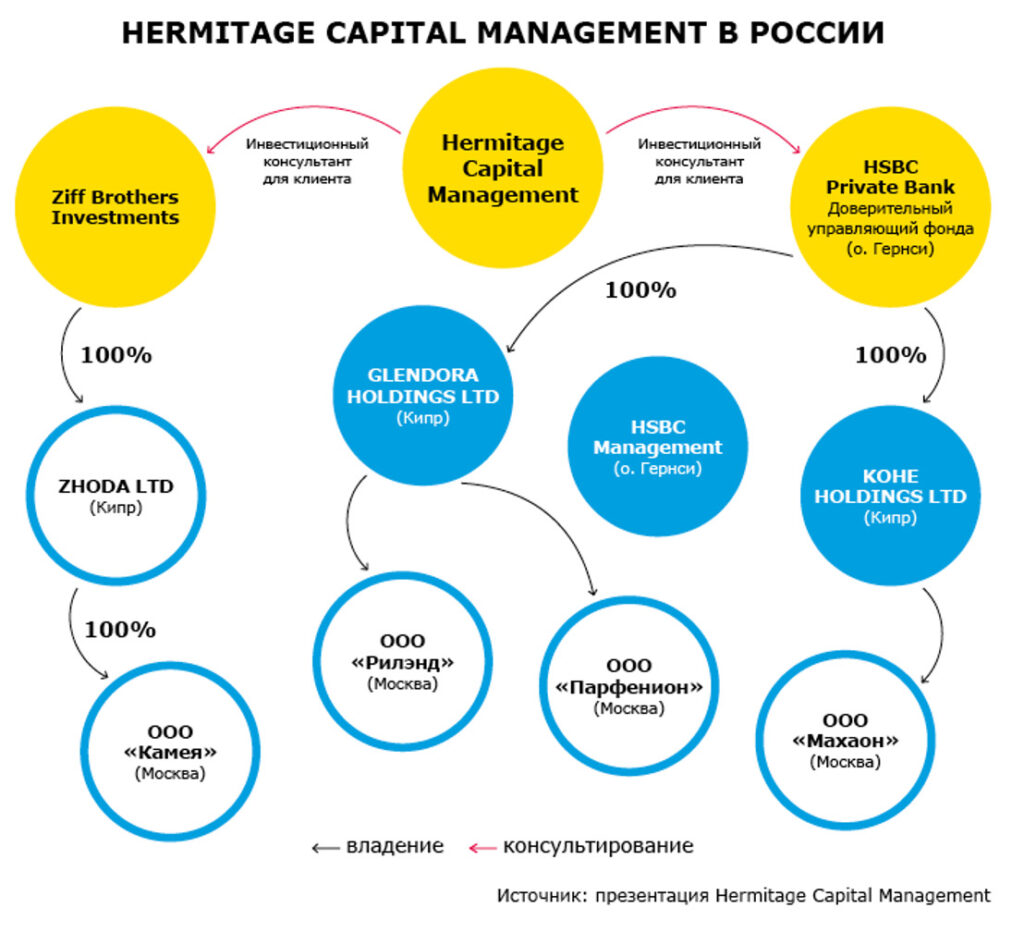
Q: The Ziffs had a long relationship with the Clintons. They were also a big Obama donor. Did Obama use the Magnitsky Act and the installation of McFaul in Moscow as a recourse to cut Ziff investment losses after the Russian government discovered the scheme?
A: There’s no way the Magnitsky Act or [Michael] McFaul could cut the Ziffs’ losses. They were in trades run through stock trading houses. And as I indicated, the Obama administration was against the Magnitsky Act.
An interesting point about the Ziff,s where the supporting the Democrats played a role is about the famous Trump Tower meeting. Russian lawyer Natalia Veselnitskaya met with the Donald Trump‘s son Donald Trump Jr, his son-in-law Jared Kushner and his campaign chairman Paul Manafort. Russiagaters were obsessed with the Trump Tower meeting, saying it was the smoking gun to prove collusion between Russia and the Trump campaign to steal the 2016 election. The Mueller Report says Russian attorney Veselnitskaya at the Trump Tower meeting promised dirt on Hillary Clinton as “part of Russia and its government support for Trump.” No evidence for that.
Veselnitskaya was the lawyer for Prevezon, a Russian company with international real estate investments, which Browder, with the help of U.S. Attorney Preet Bharara, targeted to throw attention off his own theft of $280 million from the Russian Treasury in 2007. It’s another long story worth a broadcast. Browder had no standing in the U.S. court. He hadn’t lost anything, and neither had the U.S., but he got his collaborator Bharara to bring a U.S. government case against the Russian owner of Prevezon on grounds that if anyone in the world launders money which buys U.S. property or otherwise lands in the U.S., they can be prosecuted. Cut to the chase, Bharara had no evidence and the government settled for $6 million, much less than it wanted.
Back to Trump Tower, Veselnitskaya, obviously no fan of Browder, wanted to persuade Donald Trump before the 2020 election to knock out the Magnitsky Act. Robert Goldstone is a British music publicist whose job is to get what his clients want, in this case, a meeting for Veselnitskaya with Trump people. He recklessly invented the idea of dirt on Hillary Clinton as a bait-and-switch to get Trump‘s people to come to the meeting. The Trump people did nothing illegal to meet with her. As soon as they realized there was no dirt, they left.
What Veselnitskaya had said publicly is that the Ziff Brothers had given money to the Democrats, which would include the Clinton campaign, and they had made dirty money in Russia through their illegal purchase of Gazprom shares. She also pointed out that they hadn’t properly reported the deals to the SEC for Speedwagon 1 and 2. The U.S. media never wrote that, and as far as I know the SEC never looked into it.
Q: In this case, do you think then-president Barack Obama based a major foreign policy shift on behalf of a campaign donor and the friendship he had with the Ziff brothers?
A: No. It was to get repeal of Jackson-Vanik, which U.S. business wanted.
Q: Did Moscow handle the legal investigation into Browder and Magnitsky’s activities poorly?
A: The Russian investigators and prosecutor got evidence of the truth. Normally those people don’t talk to the press. In the U.S., it’s different, where leaks is how court cases are often fought. Russia’s failure was the media and public relations war, because they couldn’t counter the lies told in Congress, by officials of the State Department, and by the media. There’s a famous cartoon of a couple of Russian soldiers standing in front of the German Reichstag as the Nazis are defeated. One says, “But we lost the public relations war.” The reason it matters now is that the Browder/Magnitsky hoax fuels the Russophobia in the U.S. and elsewhere in the West, and that has consequences today in Ukraine and elsewhere.
Q: To the best of your knowledge, was Sergei Magnitsky abused or murdered by Russian police or prison officials?
A: That is the kind of lie that Goebbels described. You say it over and over and people assume it’s true. There’s a ton of evidence, including photographs that smash that lie, evidence the western media has ignored for years. Let’s start with abuse.
Abuse: Oleg Lurie, a Russian investigative journalist, was in the same prison as Magnitsky. He was the victim of a member of the Duma who accused him of threats to get back at him for an investigation. Later Lurie was released and the prosecutor apologized. He happened to meet Magnitsky in a transit room for prisoners waiting to be taken to court or to a visiting room. Magnitsky told him his employers wanted him to write claims of abuse. He was concerned that baseless charges could cause problems for his cellmates. Lurie testified to this in the Prevezon trial in U.S. federal court.
- Forensic photos, which Browder circulated widely, show marks on Magnitsky’s wrists and ankles. The explanation was that he was banging on and kicking metal cell doors at a time when he was distraught.
- While Magnitsky was in prison, Browder did not go to the well-known human rights organizations such as Amnesty International or Human Rights Watch and he did not contact the Russian NGOs with a reputation in the West such as “Memorial” or the Moscow Helsinki Group. Zoya Svetova, a prominent Russian human rights activist who repeats Browder’s story today, wrote in a 2014 article for Khodorkovsky’s site “Open Russia”: “I knew nothing about Sergei Magnitsky. I didn’t hear from Hermitage Capital either. We also visited Butyrka prison, (…) but we were not asked for help by Magnitsky’s lawyers.” Why not?
- Magnitsky’s alleged 450 complaints were never published. The claimed Magnitsky declaration against Russian authorities was found by MSNBC reporter Ken Dilanian to be fake, though his story was banned by MSNBC after a legal threat from Browder. No that has not been reported! Dilanian said the station’s Russian translators found the what Browder claimed Magnitsky said was untrue. The U.S. media has not reported that.
- Murder: Browder claims in talks and writing that a squad of 8 government thugs entered the room where Magnitsky was held and beat him with truncheons for over an hour. First reaction, how come no marks on his body? Because the forensic photos show none. Were the thugs all aiming for his wrists and ankles. Second, Andrei Nekrasov, who did the excellent film “The Magnitsky Act—Behind the Scenes,” which you can get free online, measured the cell and found 8 people could not fit in it.
- There were two important independent reports about Magnitsky in prison and death, one by the Russian Public Oversight Commission for Human Rights Observance, an NGO charged with investigating prison conditions, and the other by Physicians for Human Rights in Cambridge, Mass, to which Browder had given documents, including the POC report. Neither claims Magnitsky was tortured or beaten or even physically abused. He did suffer from incompetent medical treatment for his pancreatitis.
- The Public Oversight Commission report November 16, 2009, the day of Magnitsky’s death said: 6:30 p.m. Review by the doctor on duty. Diagnosis: Acute Cholecystitis and Pancreatitis. Hospitalized to the surgery department for dynamic monitoring and treatment. 7:00 p.m. The patient behaves inadequately. Talks to a “voice,” looks disorientated, and shouts that someone wants to kill him. His condition is diagnosed as psychosis. The emergency doctor was called (order No. 904253). There are no body damages apart from traces of handcuffs on the wrists.
- It was planned to make an anti-spasm therapy prior to the arrival of the psychiatrist but such therapy was not possible due to the aggressive behavior of the patient. 9:15 p.m. The patient was surveyed again as his condition deteriorated. When the psychiatrist was examining the patient, the latter’s condition deteriorated sharply. He lost consciousness. The reanimation procedure was started (indirect heart massage and ventilation of lungs using the Ambu pillow). The patient was transferred to the special room where he was received an artificial ventilation of lungs and a hormones injection. Reanimation procedure lasted 30 minutes. At 9:50pm the patient died. 9:15 to 9:50. 35 minutes. Not much time for a more than one-hour beating!
- The Physicians for Human Rights, Cambridge, Mass. to which Browder sent 40 documents also made no claims of a beating.
- The European Court of Human Rights report also did not back up Browder’s claim that Magnitsky had been tortured and beaten to death. All reports are public and I link to them.
- No matter. Browder faked a death certificate claim, highlighting “closed cerebral cranial injury,” to “prove” that Magnitsky must have been beaten on his head and making illegible a line that said “no signs of a violent death detected.” However, Magnitsky’s mother told forensic investigators that her son had fallen and hit his head in 1993, 16 years earlier, and suffered a concussion, which was treated. The investigators found the medical reports and included them in the forensic document Browder received, he knew his connection of a closed cranial injury to an invented Magnitsky beating was a fabrication.
- Browder changed his killing story over a few years. Magnitsky died in November 2009. Browder said at Chatham House (London) the next month that he didn’t know how Magnitsky died and at the University of Diego Law School a year later that he’d been put in an isolation cell and left to die. He didn’t invent the beating till a year after that, December 2011, with the collaboration of former State Department official Jonathan Winer. They were lobbying for the Magnitsky Act, really the William Browder Protection Act, aimed at using U.S. power to block the Russians for going after him for massive tax evasion and theft. All this evidence is on my website.
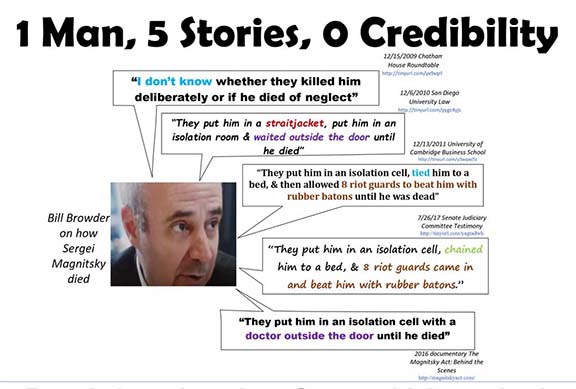
Q: When Browder brought this story into media, courtrooms, and Congress, did he provide anything you’d consider substantial to back his claims?
A: No. Never. He lied to the media and Congress. In court he gave a deposition which opened him to questions, and he had to admit that his “lawyer” Magnitsky hadn’t gone to law school, gotten a law degree or law license. But the US media and Congress didn’t care. That testimony never got into print or on air. You really have to understand that the U.S. media on the Browder/Magnitsky hoax presents one lie after another and does not deal with evidence.
Q: Considering his reputation and the fact he gave up his U.S. citizenship to avoid tax liabilities, why was Bill Browder so well received by legislators?
A: Look, the Congress supports a system for corporate and 1% tax evasion. Starting with allowing companies and people to claim profits offshore, which is where I got into this story! Browder’s tax evasion was irrelevant to U.S. legislators. Their donors do it. They support him, because he’s a weapon to bash Russia with.
Q: What was the Helsinki Group’s level of involvement in getting the Magnitsky Act through Congress?
The Helsinki Act signed by 35 countries in 1975 has as its goal to the détente between the East and the West. Essentially Sovereign equality, respect for the rights inherent in sovereignty.
Refraining from the threat or use of force
Inviolability of frontiers
Territorial integrity of states
Peaceful settlement of disputes
Non-intervention in internal affairs
Respect for human rights and fundamental freedoms, including the freedom of thought, conscience, religion or belief.
Equal rights and self-determination of peoples
Co-operation among States
Fulfillment in good faith of obligations under international law.
The Helsinki Accords, however, were not binding. The U.S. would use the human rights part to bash Russia and forget about the sections on sovereignty, territorial integrity, nonintervention in internal affairs and pretty much all the rest. Remember the 1999 NATO bombing of Serbia. The U.S. Helsinki Commission, a congressional committee would do a full 180 into a cold warrior. Kyle Parker was a staffer there. He was one of the first people Browder met in 2010 when he started his Magnitsky campaign and worked with former State Department official Jonathan Weiner for its passage. His boss, Helsinki Commission chair Senator Ben Cardin, became a Browder acolyte and was one of the main sponsors of the Magnitsky Act.
Five years later, Dec 13, 2017 Browder tweeted:
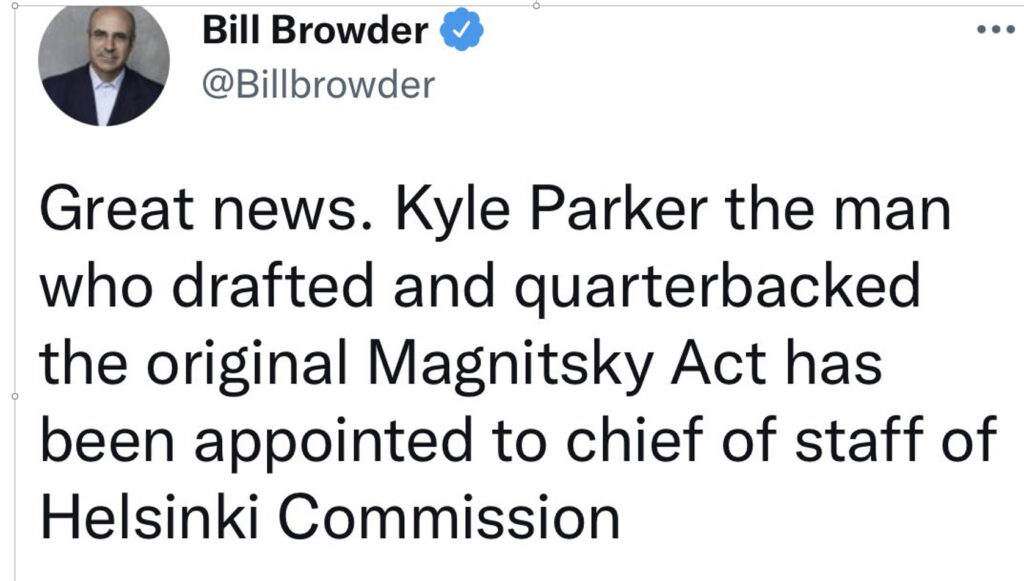

Q: Considering the illegal FBI action taken regarding the Trump tower spying event, at what depth is the Browder-Magnitsky affair reverberating through politics from then until now?
A: Rephrase question, Cut out the spying event, but the Browder-Magnitsky affair plays a role. The Browder-Magnitsky affair was the first pillar of Russiagate which set the stage for Russophobia in the U.S. government, Congress and media.
THE PILLARS OF RUSSIAGATE
Dec 2012 First pillar of Russiagate, The Browder /Magnitsky Act, accusing the Russians of murdering “lawyer” Sergei Magnitsky. Who was not a lawyer and wasn’t murdered.
BEFORE 2016 ELECTION
2016 Second pillar the Democratic National Committee story that Russians had stolen DNC emails, made by the DNC’s security consultants, CrowdStrike. It was later walked back by CrowdStrike’s president Shawn Henry at a secret House hearing in December 2017, where he said under oath he had no evidence who “exfiltrated” the emails. This was not revealed till May 2020, a year and a half later. Committee chair Adam Schiff (D-Calif) is shown as stupid or corrupt.
AFTER ELECTION BUT BEFORE SWEARING IN
January 2017 Third pillar, Steele report leaked Jan 2017, promoted by Fusion GPS working for the Democrats that accused President Trump of collusion with the Russians. Written by someone working for the Democratic-leaning Brookings Institution in Washington. Later discredited as lacking evidence.
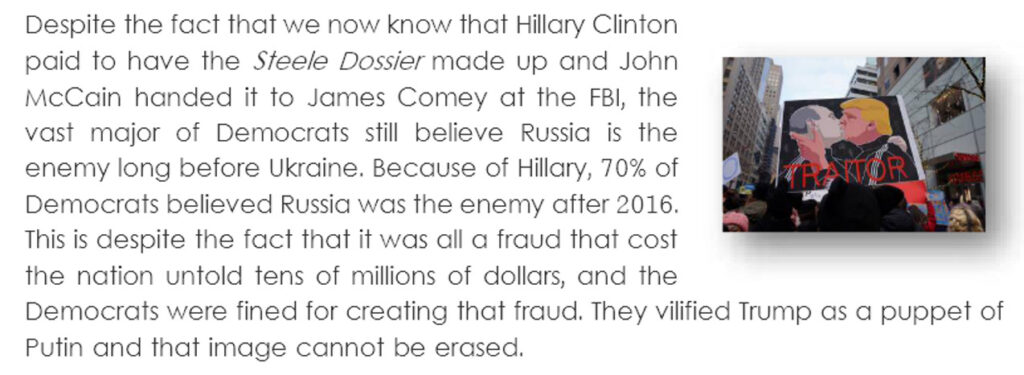
January 2017 Fourth pillar US intelligence agencies’ charge of Russian interference in the U.S. 2016 election concludes with the admission that they had no proof.
April 2019 Fifth pillar, The Mueller Report, gets the 2016 Trump Tower meeting – one of the six targets of investigation labeled “key” — very wrong. It was a deception intended to keep the myth of collusion in the air while dismissing that any collusion took place. Ironically, as it attacks Donald Trump and top campaign officials for lying, the report itself lies about the meeting. It promotes Browder’s fabrications, citing, quote: “the Magnitsky Act, which imposed financial sanctions and travel restrictions on Russian officials and which was named for a Russian tax specialist who exposed a fraud and later died in a Russian prison.” Magnitsky did not expose a fraud. It was done by a Russian, Rimma Starova, the figurehead director of a Browder BVI shell company.
But as you look at the chronology, it’s not hard to conclude that the fabrications were created by the Deep State or collaborators not only to attack Russia but also conveniently to help the Democrats to promote the presidential election of Hillary Clinton.



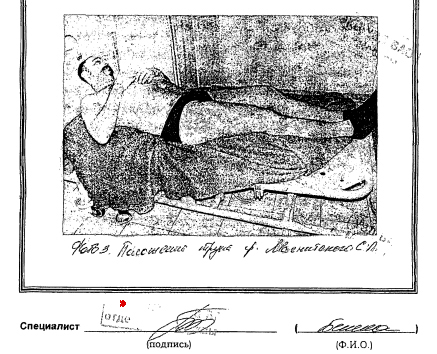
Pingback: Canadian journalist challenges "gold standard" accountants to examine lies of Nov 7 speaker, fraudster Bill Browder : The Komisar Scoop
I have read quite a few people who are dubious about Ms. Komisar’s motivations for investigating Browder, and question her motives. I find this puzzling. It seems that people who do this are missing the bigger picture. Investigative journalism is not meant to be a court of law. It enables people to see different sides and perspectives to then enable them to come to their own judgements. The point is not that such investigations are not about deciding whether Bill Browder is a bad person or a good person. The great contribution of Liberalism in the history of Western Civilization is that it separated legal judgements from moral judgements. The point is that all individuals are capable of misdeeds and that merely coming across as being genuine and well-intentioned is not sufficient. ‘The road to hell is paved with…’, etc. etc. That is why we have laws. You cannot build a society on love or good-heartedness. There may be all kinds of complicated motivations in Browder’s psyche for why he may have started this whole crusade for Magnitsky – a sense of personal guilt that he got Sergei involved in shady dealings with shell companies and tax evasion? But did he get him involved or did Sergei choose of his own accord? Who knows, we can speculate endlessly on that, just as we can speculate endlessly on who shot JFK in Dealey Plaza. Nekrovsky makes the point towards the end of his film on the Magnitsky Act that he is troubled not so much by Browder’s fight for justice for human rights abuses in Russia but more when one person makes human rights into a kind of party-cause which might possibly be serving their own interests. But perhaps that is the problem with the whole notion of human rights: Proudhon once said that anyone who uses the word humanity in the politics wants to cheat. The problem with human rights is that it assumes it is possible to have a world without politics. And that means a world without human actors who can be held responsible for their actions. Some people say that “well, Browder with his offshoring was just doing what everyone else in Russia was doing at the time”. That, however, doesn’t mean that it was okay. If we followed that argument we would have to say that the Nazi’s were Okay, because so many Germans voted for them.
I think these remarks by Philippe Nemo from his book, What is the West?, are to the point here:
“political leaders do not have – and will never have – a monopoly on or privilege of distinguishing Truth, Beauty, or Good. Men and women in government are individuals like any others. In fact, they may be worse because they have the potential to commit greater sins in view of their greater powers. Therefore, it would be foolhardy to suppose they have either greater knowledge, inspiration or vocation that would place them above the law. On the contrary, they require greater control to prevent them from doing harm. This implies the creation of institutions that check the extent of their power”
I have read quite a few people who are dubious about Ms. Komisar’s motivations for investigating Browder, and question her motives. I find this puzzling. It seems that people who do this are missing the bigger picture. Investigative journalism is not meant to be a court of law. It enables people to see different sides and perspectives to then enable them to come to their own judgements. The point is not that such investigations are not about deciding whether Bill Browder is a bad person or a good person. The great contribution of Liberalism in the history of Western Civilization is that it separated legal judgements from moral judgements. The point is that all individuals are capable of misdeeds and that merely coming across as being genuine and well-intentioned is not sufficient. ‘The road to hell is paved with…’, etc. etc. That is why we have laws. You cannot build a society on love or good-heartedness. There may be all kinds of complicated motivations in Browder’s psyche for why he may have started this whole crusade for Magnitsky – a sense of personal guilt that he got Sergei involved in shady dealings with shell companies and tax evasion? But did he get him involved or did Sergei choose of his own accord? Who knows, we can speculate endlessly on that, just as we can speculate endlessly on who shot JFK in Dealey Plaza. Nekrasov makes the point towards the end of his film on the Magnitsky Act that he is troubled not so much by Browder’s fight for justice for human rights abuses in Russia but more when one person makes human rights into a kind of party-cause which might possibly be serving their own interests. But perhaps that is the problem with the whole notion of human rights: Proudhon once said that anyone who uses the word humanity in politics wants to cheat. The problem with human rights is that it assumes it is possible to have a world without politics. And that means a world without human actors who can be held responsible for their actions. Some people say that “well, Browder with his offshoring was just doing what everyone else in Russia was doing at the time”. That, however, doesn’t mean that it was okay. If we followed that argument we would have to say that the Nazi’s were Okay, because so many Germans voted for them.
I think these remarks by Philippe Nemo from his book, What is the West?, are to the point here:
“political leaders do not have – and will never have – a monopoly on or privilege of distinguishing Truth, Beauty, or Good. Men and women in government are individuals like any others. In fact, they may be worse because they have the potential to commit greater sins in view of their greater powers. Therefore, it would be foolhardy to suppose they have either greater knowledge, inspiration or vocation that would place them above the law. On the contrary, they require greater control to prevent them from doing harm. This implies the creation of institutions that check the extent of their power”